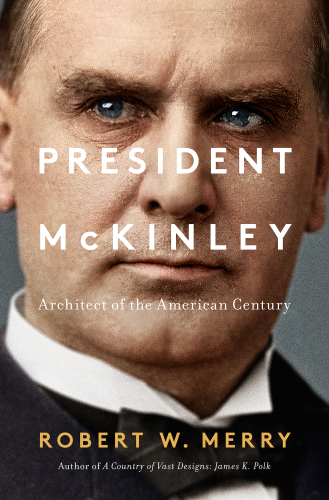
President McKinley
Architect of the American Century
- اطلاعات
- نقد و بررسی
- دیدگاه کاربران
نقد و بررسی

May 29, 2017
William McKinley, 25th president of the U.S., is largely remembered for bringing his country into a war with Spain over Cuba, then three years later dying from Leon Czolgosz’s bullets. In this political biography, journalist Merry (Where They Stand) argues for an overdue reevaluation of McKinley, who has been eclipsed by his flamboyant successor, Theodore Roosevelt. According to Merry, McKinley was a man of focus and perception rather than grand vision—“cautious, methodical, a master of incrementalism”—who led the U.S. through its transformation into a global power. The native Ohioan fought for the Union during the Civil War, then studied law, set up his own practice, and became involved in local politics. The first third of the book might be slow going for readers not fascinated with the details of a fractured 19th-century Republican Party, tariff debates, and Ohio political minutiae. Yet Merry’s clear and nimble writing keeps the story moving along to McKinley’s White House years and the Spanish-American War. In shaping the war-ending Treaty of Paris of 1898, McKinley affirmed American imperialist ambitions, propelling the U.S. onto the world stage. By focusing on McKinley’s deliberate choices in dealing with Spain, Hawaii, and the Philippines, Merry convincingly portrays McKinley as a crucial actor in American imperialism. Illus. Agent: Philippa Brophy, Sterling Lord Literistic.

June 15, 2017
A fresh biography of the short-lived presidency of William McKinley (1843-1901), "an unlikely figure to be presiding over the transformation of America."This is not the first attempt to rehabilitate McKinley, who served from 1897 until he was assassinated by an anarchist in September 1901, but former Congressional Quarterly CEO Merry (Where They Stand: The American Presidents in the Eyes of Voters and Historians, 2012, etc.) makes a persuasive case that he was not just an amiable Ohio governor, protege of Cleveland businessman Mark Hanna, but a canny, ambitious statesman. Elected to the House of Representatives in 1877, he remained until 1891. There followed two terms as governor and an easy win for the 1896 Republican presidential nomination. Once elected, McKinley found himself involved in what might be called Operation Cuban Freedom (parallels with recent events are irresistible). Cubans were miserable and oppressed, and the American invasion was widely supported. Victory was easy, but given freedom, Cuba showed little gratitude. Merry clearly admires McKinley, arguing that, "though not a man of vision, he was a man of perception who saw clearly the major developments of his time." Some ideas, such as reciprocal trade agreements, were ahead of his time. No apologist for big business, he was more liberal than his overrated predecessor, Grover Cleveland. The author maintains that McKinley, not his successor, Theodore Roosevelt, ushered America onto the world stage and jump-started the progressive movement. McKinley also showed excellent taste in appointments, which included Elihu Root, John Hay, George Cortelyou, Philander Knox, Charles Dawes, and William Howard Taft. Roosevelt became vice president in 1900 when he discouraged party leaders who opposed him. Merry believes McKinley was preparing to launch an aggressive trust-busting program when he was assassinated. Although unlikely to share Merry's very high opinion of McKinley, most readers of this intelligent biography will agree that he was an astute politician and strong leader.
COPYRIGHT(2017) Kirkus Reviews, ALL RIGHTS RESERVED.

April 15, 2017
Editor of the National Interest, veteran journalist Merry resurrects the reputation of President William McKinley, whose efforts, e.g., acquiring Hawaii and the Philippines and initiating the Open Door policy regarding China, made the United States a world power.
Copyright 2017 Library Journal, LLC Used with permission.




دیدگاه کاربران